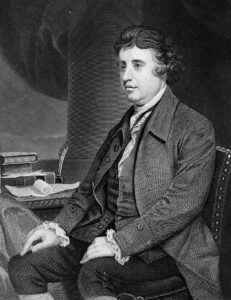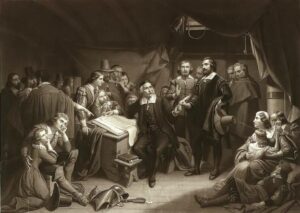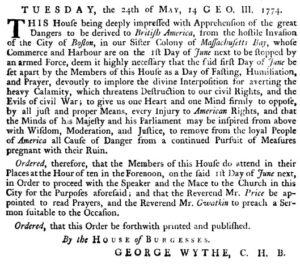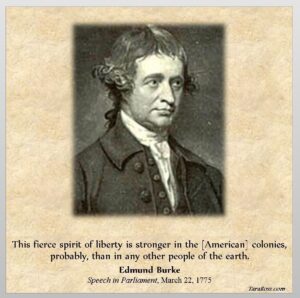 Edmund Burke was born January 12, 1729 in Dublin, Ireland. Though his mother, Mary, was a Roman Catholic, he adhered to the Protestant beliefs of his father, Richard, remaining in the Anglican Church.
Edmund Burke was born January 12, 1729 in Dublin, Ireland. Though his mother, Mary, was a Roman Catholic, he adhered to the Protestant beliefs of his father, Richard, remaining in the Anglican Church.
While attending Protestant Trinity College in 1744, he started his own debating society, “Edmund Burke’s Club.” Though his father desired him to study law, he pursued a career of writing and speaking. His legacy became the power of the pen and tongue, with Edwin Feulner calling him a “champion of liberty and order” in the cause of American liberty. Feulner accurately traces our nation’s unique heritage of “ordered liberty” from ancient Israel to Philadelphia.
What is interesting is that Burke, though aiding his voice in favor of the American colonial resistance to the King, did not agree with America’s right to independence. In other words, Burke did not see the biblical root of liberty as clearly as the clergy who had preached it for nearly a century in colonial churches, or as the key leaders espousing it. God uses acts of tyranny to increase the value of His ideas! Consider Richard Samuelson’s idea that “when the revolution came, the Americans found that beneath the rights of Englishmen in America were the natural rights of men, and they built their new regime upon that foundation.” Those “natural rights” were God-given and unalienable!
 Change most often comes by degree. Half-measures are common when the leaven of truth enters the loaf of culture (Matthew 13:33). This simply means that we must be willing to see the aid that God brings, though there may not be total agreement in every area with those He uses. The process of truth’s influence is “precept upon precept, line upon line, here a little, there a little” (Isaiah 28:10). The Pilgrims, when writing the Mayflower Compact to unite separatist and stranger under one civil covenant, recognized this process and focused on a unified purpose: “For the Glory of God and advancement of the Christian Faith and honor of our King” and “to enact, constitute and frame such just and equal laws, as shall be thought most meet and convenient for the general good of the Colony.” The result was harmony, when there could have been division through forced union in church or state.
Change most often comes by degree. Half-measures are common when the leaven of truth enters the loaf of culture (Matthew 13:33). This simply means that we must be willing to see the aid that God brings, though there may not be total agreement in every area with those He uses. The process of truth’s influence is “precept upon precept, line upon line, here a little, there a little” (Isaiah 28:10). The Pilgrims, when writing the Mayflower Compact to unite separatist and stranger under one civil covenant, recognized this process and focused on a unified purpose: “For the Glory of God and advancement of the Christian Faith and honor of our King” and “to enact, constitute and frame such just and equal laws, as shall be thought most meet and convenient for the general good of the Colony.” The result was harmony, when there could have been division through forced union in church or state.
As the year 1775 dawned on the 13 American colonies, the providential preparation for an unprecedented unity had been laid the previous year. In retaliation for the Boston Tea Party, England’s Parliament passed the Boston Port Bill for the closure of its harbor on June 1, 1774. Days of prayer and fasting were called throughout the colonies, and in the words of Thomas Jefferson, Governor of Virginia, “We were under the conviction of the necessity of arousing our people from the lethargy into which they had fallen… and thought that the appointment of a day of general fasting and prayer would be most likely to call up and alarm their attention.”
 Historian Rosalie Slater wrote: “…Instead of isolating Boston, it had the effect of uniting all the colonies for the first time in their history.Within two months the flow of Christian support and unity of purposes had cemented together the thirteen colonies in a manner which all their efforts at unification had never achieved.” Once again, God used the fear of tyranny to humble hearts.
Historian Rosalie Slater wrote: “…Instead of isolating Boston, it had the effect of uniting all the colonies for the first time in their history.Within two months the flow of Christian support and unity of purposes had cemented together the thirteen colonies in a manner which all their efforts at unification had never achieved.” Once again, God used the fear of tyranny to humble hearts.
On the other side of the Atlantic, Edmund Burke had already exposed the error of Parliament’s force by bringing the leaven of truth in opposition to the Stamp Act with his maiden speech in 1766. Burke’s speeches in those days annoyed Lord North but had not changed his mind. On April 19, 1774, a year before Lexington, Burke gave his speech on “American Taxation,” urging Parliament to repeal the tax duty. The stage was now set for his speech on “Conciliation with the Colonies” on March 22, 1775. This speech, about 89 pages long, would probably have taken several hours for him to deliver. Today we no longer hear such momentous speeches filled with principles, passion, and clear articulation!
Early in his speech, Burke clarified his proposal of peace in the spirit of reconciliation:
The proposition is Peace. Not Peace through the medium of war; not Peace to be hunted through the labyrinth of intricate and endless negotiations; not Peace to arise out of universal discord, fomented, from principle, in all parts of the empire; not Peace to depend on the juridical determination of perplexing questions, or the precise marking of shadowy boundaries of a complex government. It is simple Peace, sought in its natural course and in its ordinary haunts; it is Peace sought in the spirit of Peace and laid in principles purely pacific. I propose, by removing the ground of the difference, and by restoring the former unsuspecting confidence of the Colonies in the Mother Country, to give permanent satisfaction to your people, and (far from a scheme of ruling by discord) to reconcile them to each other in the same act, and by the bond of the very same interest which reconciles them to British Government.
 The heart of his message is a repudiation of the use of force to bring unity:
The heart of his message is a repudiation of the use of force to bring unity:
…the use of force alone is but temporary. It may subdue for a moment, but it does not remove the necessity of subduing again; and a nation is not governed which is perpetually to be conquered…. Terror is not always the effect of force; and an armament is not a victory…. Power and authority are sometimes bought by kindness; but they can never be begged as alms by an impoverished and defeated violence… you impair the object by your very endeavors to preserve it.
…This character of the Americans, a love of freedom is the predominating feature which marks and distinguishes the whole; and as an ardent is always a jealous affection, your Colonies become suspicious, restive, and untractable, whenever they see the least attempt to wrest from them by force, or shuffle from them by chicane, what they think the only advantage worth living for. This fierce spirit of liberty is stronger in the English Colonies probably than in any other people of the earth, and this from a great variety of powerful causes….
We can learn many lessons from Edmund Burke and how God providentially used him. We often reject help if it is not perfectly aligned with our views in every area. But God used Burke in our nation’s resistance to tyranny, though his views were not adopted by Parliament, and though he did not agree with our independence. He articulated sound logic as to why liberty is a precious commodity. Let us expect God to raise up people to help our own nation as we pray for truth to prevail and liberty under law to be restored!







